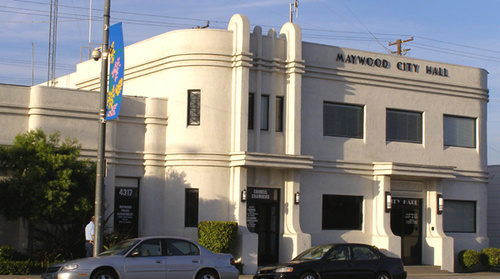
On Tuesday, the small community of Maywood, California, announced its intention to lay off all of its non-elected employees, including police officers, and contract out its operations to the neighboring city of Bell. This move raises several key questions about municipal accountability: Will the elected officials who oversee Bell be answerable to the taxpayers of Maywood? Will Maywood’s citizens receive quality public services from its neighbor? How will Bell determine how to prioritize services across the two cities? And, since Maywood council members will continue to be paid, will their job duties now entail oversight of Bell?
Susan Duerksen, who works for the non-profit Center on Policy Initiatives, which runs InThePublicInterest.org, a resource center on government outsourcing to private companies, said the agreement raises red flags: “In all contracts, governments must be vigilant about holding the other party accountable and making sure citizens have recourse if things go wrong. Without adequate accountability protections, the citizens of Maywood may regret laying off an experienced and qualified workforce.”
Put another way, just because Bell is a municipality and not a private contractor, that doesn’t necessarily mean it will be any more accountable to Maywood’s citizens than a for-profit entity.
Indeed, a report in today’s LA Times is less than encouraging. The paper reports that “the Los Angeles County district attorney’s office is investigating why city council members in the small, working-class city of Bell are paid nearly $100,000 a year for a part-time job.” Reports like these, which surely surfaced once reporters started paying attention to tiny Bell, do not augur well for accountable, open government. According to the article, under state law, council members should receive something more like $4,800 per year for their services.
The Maywood-Bell deal might seem like an anomaly. But other California municipalities are facing incredible revenue shortages for a variety of reasons, including recessionary slowdowns and fiscal mismanagement. (Maywood’s problems stem from its history of mismanagement and liability for lawsuits, primarily against its police department.) Yesterday the LA Times reported that Siskiyou County, facing a $3.7 million deficit, will close seven of its 11½ libraries. The county only has enough money to operate the rest through December, at which point they too might be shuttered–presumably along with the eyes of youngsters just discovering the joy of reading.
So what are counties like Siskiyou to do? NBC newsman Tom Brokaw says consolidation is the solution.
Brokaw’s proposal, which is Maywood’s reality, might be a good one. But only if consolidated municipalities like Bell and Maywood can prove that they’ll be accountable to all the citizens they represent–before the deal is signed.
–Lowell Goodman Lowell Goodman is the Communications Specialist for the Center for Public Accountability.
 Share
Share
 Share
Share
“The Maywood Model” – really? I find it amazing that people are referring to this as a business model. It ignores the fact that these Maywood council members lacked any business sense. They lacked any accountablity for failing to attend to city government and their obliogations to the community. Now, they are turning their failure into a new business model. Had Maywood followed the recommendations of the joint insurance authority they would likely have been able to continue running their own city operations. Had the Maywood council engaged in less meddling in the daily operations of the police department and selected competent leaders before their last chief, they would likely have been able to continue operating. Now it would seem that the national media chooses to report this failure as a business model. What next? Outsourcing our federal government’s responsibilities to a neighboring country?